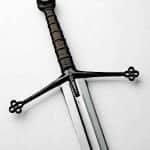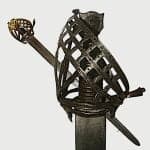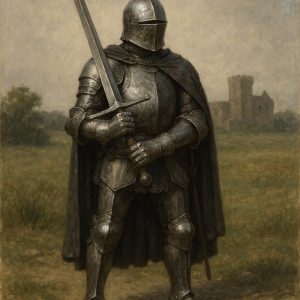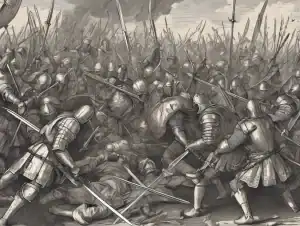The broadsword was a dominant force on the battlefields of medieval and Renaissance Europe, prized for its cutting power, versatility, and intimidating presence. Featuring a wide, double-edged blade and a one-handed or hand-and-a-half grip, the broadsword allowed warriors to deliver powerful slashing attacks while maintaining control in close combat. This weapon was favored by knights, foot soldiers, and duelists, and it came to symbolize chivalry and martial skill. From its use in armored warfare to civilian defense, the broadsword’s enduring legacy lies in its perfect balance of form and function.

Types of Broadsword
The term Broadsword was really a description of a group of swords which enabled modern historians to put a number of swords with similar characteristics under the same category of ‘Broadsword’.
Broadswords
- Claymore Swords
- Basket-Hilted Swords
- Sabre Swords
Since the earliest of medieval times Broadswords were used in different types of battles on different types of terrain.

Broadsword History
The Broadsword was used from early in the medieval period from around the 6th until the 16th century, these medieval weapons kept their original design as a double-edged sword that was used for cutting and slashing throughout the period.

Special editions of the Broadsword were then introduced after the 14th century with the first being introduced as the Claymore sword, followed by the Basket-hilted sword, and then finally the Sabre sword which made an appearance after the medieval period in the 19th century.

Who used the Broadsword?
Since its introduction in around the 6th century, the Broadsword became a favoured weapon of choice for medieval knights. With proper dedication and extensive training, they were able to dominate the battlefield using their parrying and attacking skills, whilst being protected from attack with their sturdy Armour.

Since the Broadsword was a melee weapon that was 30 to 45 inches (76cm to 114cm) long it was primarily used in very close combat as it was a light medieval sword that was easy to control with just one hand.
Medieval Broadsword Dimensions
The Broadsword has a double-edged blade with 2-3 inches (5 to 7.5 cm) width at the base, which then tapers to a point. Depending on the user’s desire the sword ranged from 30 to 45 inches (76 to 114cm) in length with an average weight of 3 to 5 pounds (1 to 2 kg).

How was the Broadsword used in Battle?
Depending on the battle and current equipment being used the Broadsword could be used with one or two hands. The most effective way of using a Broadsword was with one hand, accompanied by a shield as has been recorded throughout history.

The knights which used the longest version of the sword were very well trained usually from an early age and wore appropriate armour that allowed suitable protection and flexibility, on horseback they were able to take on 5 – 10 soldiers at the same time without any difficulty.
Types of Broadsword
The Claymore Sword
A version of the broadsword used during the 15th to 17th century in Scotland by the Highlanders.

The Basket-Hilt Broadsword
This design offered a protective basket on the hilt of the sword in order to protect the hand carrying it.

The Sabre sword – this design appeared in the mid-modern period of medieval times and had many different variations, such as the double edge, one edge, curved and straight sword, however they shared the same pointed and very sharp tip.

Advantages of a Broadsword
The Broadsword was considered to be a very agile and lightweight weapon which made slashing and cutting quite easy with the proper training.
Depending on its length it could serve different purposes and soldiers usually preferred the 45 inches (114cm) version because of the range of fighting it allowed, nothing but the two-handed long sword could reach it in the melee range of combat and this gave the fighter an advantage as the weapon was light and agile.
Disadvantages of the Broadsword
Training to use a Broadsword was very difficult and time-consuming and only the most determined of Knights mastered it, this was very hard work and took some considerable time. The training was hard but if you were prepared to put in the effort you could become a well-respected member of medieval society and would be well rewarded for your unique set of skills, as one skilled Broadsword master could take on and defeat 5 to 10 opponents at the same time.





